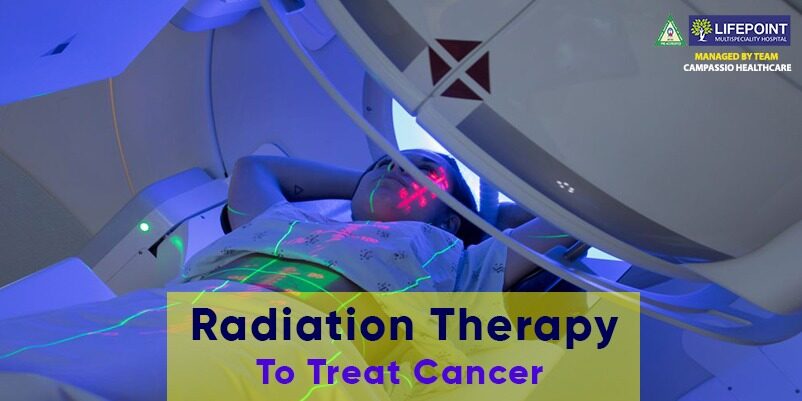Radiotherapy (also known as radiation therapy) is a cancer treatment in which high radiation levels kill cancer cells and shrink tumours. Low doses of radiation are used in x-rays to see inside your body, for instance, if your teeth have broken or your bone has fractured.
Radiotherapy’s effectiveness against cancer
Radiation therapy damages DNA to kill cancer cells or slow their growth at high doses. The damaged DNA leads to cancer cells ceasing to divide or die. The body breaks down and removes the damaged cells when they die.
Radiotherapy does not immediately kill cancer cells. The DNA of cancer cells is damaged only after days or weeks of treatment. For weeks or months following radiation therapy, cancer cells keep dying.
Radiation therapy for cancer types
Many types of cancer are treated with external beam radiation therapy. The most common cancers treated with brachytherapy are the head and neck, breast, cervix, and prostate. Certain types of thyroid cancer are often treated with radioactive iodine or I-131.
Radiation therapy using targeted radionuclides treats advanced prostate cancer and gastroenteropancreatic neuroendocrine tumours (GEP-NET). Molecular radiotherapy is another name for this treatment type.
Radiation therapy for cancer patients
Cancer symptoms can be eased with radiation therapy. Radiation therapy treats cancer by curing it, preventing it from returning, stopping its growth, and treating it. These treatments are known as palliative treatments because they relieve symptoms.
Aside from treating pain and other problems caused by the tumour, external beam radiation may shrink tumours and relieve issues like breathing difficulties and bowel and bladder incontinence. Radiopharmaceuticals can be used to treat cancer-related pain in the bones.
How much does radiation therapy cost?
It can be expensive to receive radiation therapy. A lot of medical personnel are involved in the process. It depends on where you live, what kind of radiation therapy you need, and how many treatments you need to get an accurate estimate of the cost of radiation therapy.
If your health insurance covers certain services, ask your company. Most insurance plans usually cover radiation therapy. Ask the business office of the clinic or hospital where you receive treatment for more information. Some organizations may be able to help you if you need financial assistance.
Those seeking such organizations can search the database of the National Cancer Institute, Organizations that Offer Support Services, for “financial assistance.” Or call 1-800-4-CANCER (1-800-422-6237) for information about organizations that can help.
Radiation therapy patients require special diets.
Side effects caused by radiation can make eating difficult, such as nausea, mouth sores, and esophagitis. You must consume enough calories and protein to maintain weight during radiation therapy since your body uses a lot of energy to heal.
A doctor or nurse can assist you if you have difficulty eating or maintaining your weight. Talking to a dietitian might also be beneficial. Check out the booklet Eating Hints if you want more information about eating disorders.
Radiation therapy and working
During radiation therapy, some people can work full-time. In some cases, they may not be able to work at all. Depending on how you feel, you may be able to work more or less. Find out what kind of treatment you may expect from your doctor or nurse.
You will likely be able to work when you begin your radiation treatment. Over time, you are likely to feel fatigued, less energetic, and weaker. If you complete treatment, you may feel better after a few weeks or take months.
You may feel too ill to work during radiation therapy. If you need medical leave, speak with your employer. While you’re on medical vacation, check if your insurance will cover treatment costs.

